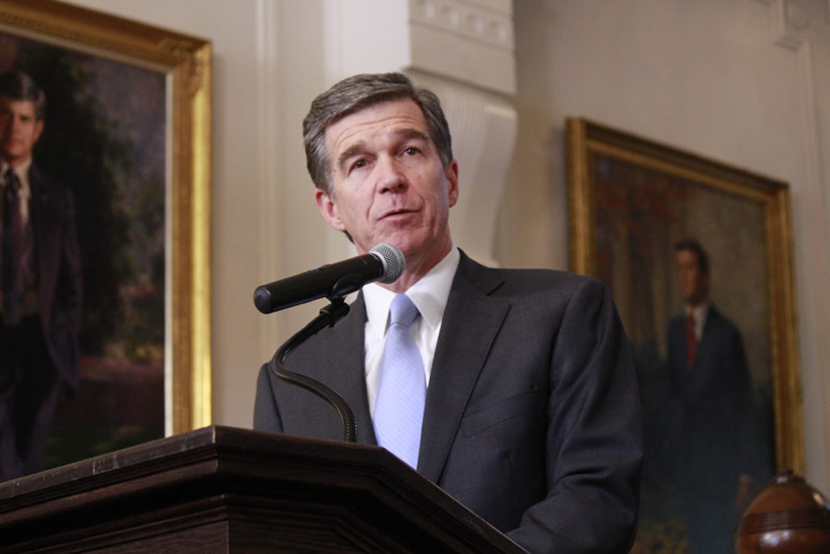In Difficult Times Good People gravitate towards Absolute Truth
Funding Surplus in N.C.? The Money is Already Spent
Publisher's note: This post appears here courtesy of the Carolina Journal, and written by Becki Gray, Senior Vice President of the John Locke Foundation.
There's no extra money.
The 2019-20 General Assembly session is well under way. Bills are being filed and committees are meeting, but the attention will soon fall on the biennial budget, which the governor introduced this week and included new and expanded spending, including a 9.1 percent raise for teachers. Early revenue returns have been optimistic, even showing a surplus in the $150 million range. But folks eager to spend that might want to proceed cautiously. The money is already spent.
Smart budget decisions and a strong economy over the past few years enabled lawmakers to put $2 billion into the savings reserve fund, about 10 percent of the general fund and the highest level of savings in state history. Thank goodness it was available when Hurricanes Michael and Florence devastated eastern communities. The General Assembly took about $850 million out of the rainy-day fund for hurricane recovery with a promise to replenish it within five years. They would be wise to rebuild that savings account as quickly as possible to ensure North Carolina is prepared for the next storm, whether a natural disaster or an economic downturn. In addition, a 2016 law requires 15 percent of new savings go directly into the savings reserves.
What it takes to run the Medicaid program will be recalculated, as it is every year under the ACA, to adjust spending based on increasing medical costs and additions to enrollment and usage. Twenty percent of North Carolinians are on Medicaid, and almost 50 percent of babies born here are covered by Medicaid. A proposed expansion would add 500,000 mostly able-bodied childless, working-age adults to the program. As a federal entitlement program, Medicaid funding has precedent, and this year's adjustment to the current program could cost upwards of $200 million.

Gov. Roy Cooper (CJ photo by Don Carrington)
Commitments have been made for repairs and renovations to state-owned facilities, new construction is under way on projects across the state, and general obligations bonds and other debt equals $7.3 billion. A recent change in the law requires 4 percent of the general fund go toward paying these debts and obligations. The State Capital and Infrastructure Fund is $956 million; the $150 million is new money not spent last year.
North Carolina is now the ninth most-populous state, with more than 112,000 people moving here in the past year. As school enrollment grows, education costs rise. Recent reductions in class size require more school funding for the additional teachers as classes get smaller.
Thanks to a commitment to make teacher pay competitive with other states, and with four consecutive years of pay raises, average teacher pay is $53,000. Promises were made to raise the average salary to $55,000 next year.
Our state health and pension plans for state employees, teachers and retirees has $50 billion in unfunded liabilities. Promises were made to continue paying the health-care costs of the 700,000 workers covered under the state health plan. As medical costs increase, so do costs to the state health plan. About 950,000 retirees in the system are entitled to receive pension benefits promised when hired. A recent law establishes an Employee Benefit Trust Fund; building a reserve for this unfunded liability is a good idea. Meanwhile, the promise made to state employees has to be kept, and it's an expensive one - about $150 million this year.
Promises were made to continue expanding Opportunity scholarships. Costs will be incurred as we implement the Raise the Age program for juveniles in the prison system.
Built-in obligations mean added spending as additional tax cuts become effective in 2019. The personal income tax will go down from 5.499 percent to 5.25 percent, and the 3 percent corporate tax rate will tick down to 2.25 percent.
Promises made, promises kept.
Reining in the growth of state government, cutting taxes, reducing burdensome regulations, and making the right investments in education and infrastructure have paid off. Unemployment is the lowest in 17 years. North Carolina's economy is strong and continues to grow. To ensure continued growth, strong fiscal discipline is needed. We should stay the course, live within our means, save when we can and spend cautiously and carefully. That means making reasonable promises you can keep, and not spending money you don't have.
Go Back
There's no extra money.
The 2019-20 General Assembly session is well under way. Bills are being filed and committees are meeting, but the attention will soon fall on the biennial budget, which the governor introduced this week and included new and expanded spending, including a 9.1 percent raise for teachers. Early revenue returns have been optimistic, even showing a surplus in the $150 million range. But folks eager to spend that might want to proceed cautiously. The money is already spent.
Smart budget decisions and a strong economy over the past few years enabled lawmakers to put $2 billion into the savings reserve fund, about 10 percent of the general fund and the highest level of savings in state history. Thank goodness it was available when Hurricanes Michael and Florence devastated eastern communities. The General Assembly took about $850 million out of the rainy-day fund for hurricane recovery with a promise to replenish it within five years. They would be wise to rebuild that savings account as quickly as possible to ensure North Carolina is prepared for the next storm, whether a natural disaster or an economic downturn. In addition, a 2016 law requires 15 percent of new savings go directly into the savings reserves.
What it takes to run the Medicaid program will be recalculated, as it is every year under the ACA, to adjust spending based on increasing medical costs and additions to enrollment and usage. Twenty percent of North Carolinians are on Medicaid, and almost 50 percent of babies born here are covered by Medicaid. A proposed expansion would add 500,000 mostly able-bodied childless, working-age adults to the program. As a federal entitlement program, Medicaid funding has precedent, and this year's adjustment to the current program could cost upwards of $200 million.

Gov. Roy Cooper (CJ photo by Don Carrington)
Commitments have been made for repairs and renovations to state-owned facilities, new construction is under way on projects across the state, and general obligations bonds and other debt equals $7.3 billion. A recent change in the law requires 4 percent of the general fund go toward paying these debts and obligations. The State Capital and Infrastructure Fund is $956 million; the $150 million is new money not spent last year.
North Carolina is now the ninth most-populous state, with more than 112,000 people moving here in the past year. As school enrollment grows, education costs rise. Recent reductions in class size require more school funding for the additional teachers as classes get smaller.
Thanks to a commitment to make teacher pay competitive with other states, and with four consecutive years of pay raises, average teacher pay is $53,000. Promises were made to raise the average salary to $55,000 next year.
Our state health and pension plans for state employees, teachers and retirees has $50 billion in unfunded liabilities. Promises were made to continue paying the health-care costs of the 700,000 workers covered under the state health plan. As medical costs increase, so do costs to the state health plan. About 950,000 retirees in the system are entitled to receive pension benefits promised when hired. A recent law establishes an Employee Benefit Trust Fund; building a reserve for this unfunded liability is a good idea. Meanwhile, the promise made to state employees has to be kept, and it's an expensive one - about $150 million this year.
Promises were made to continue expanding Opportunity scholarships. Costs will be incurred as we implement the Raise the Age program for juveniles in the prison system.
Built-in obligations mean added spending as additional tax cuts become effective in 2019. The personal income tax will go down from 5.499 percent to 5.25 percent, and the 3 percent corporate tax rate will tick down to 2.25 percent.
Promises made, promises kept.
Reining in the growth of state government, cutting taxes, reducing burdensome regulations, and making the right investments in education and infrastructure have paid off. Unemployment is the lowest in 17 years. North Carolina's economy is strong and continues to grow. To ensure continued growth, strong fiscal discipline is needed. We should stay the course, live within our means, save when we can and spend cautiously and carefully. That means making reasonable promises you can keep, and not spending money you don't have.
Latest Op-Ed & Politics
|
Biden abuses power to turn statute on its head; womens groups to sue
Published: Friday, April 19th, 2024 @ 8:28 pm
By: John Steed
|
|
The Missouri Senate approved a constitutional amendment to ban non-U.S. citizens from voting and also ban ranked-choice voting.
Published: Friday, April 19th, 2024 @ 12:33 pm
By: Daily Wire
|
|
Democrats prosecuting political opponets just like foreign dictrators do
Published: Friday, April 19th, 2024 @ 10:58 am
By: John Steed
|
|
populist / nationalist / sovereigntist right are kingmakers for new government
Published: Friday, April 19th, 2024 @ 10:04 am
By: John Steed
|
|
18 year old boy who thinks he is girl planned to shoot up elementary school in Maryland
Published: Friday, April 19th, 2024 @ 8:46 am
By: John Steed
|
|
Biden assault on democracy continues to build as he ramps up dictatorship
Published: Friday, April 19th, 2024 @ 8:26 am
By: John Steed
|
|
illegal alien "asylum seeker" migrants are a crime wave on both sides of the Atlantic
Published: Thursday, April 18th, 2024 @ 8:10 am
By: John Steed
|
|
UNC board committee votes unanimously to end DEI in UNC system
Published: Thursday, April 18th, 2024 @ 7:54 am
By: John Steed
|
|
this is the propagandist mindset of MSM today
Published: Wednesday, April 17th, 2024 @ 3:04 pm
By: John Steed
|
|
Police in the nationís capital are not stopping illegal aliens who are driving around without license plates, according to a new report.
Published: Wednesday, April 17th, 2024 @ 8:59 am
By: Daily Wire
|
|
same insanity that created Covid
Published: Wednesday, April 17th, 2024 @ 8:58 am
By: John Steed
|
|
Davidaon County student suspended for using correct legal term for those in country illegally
Published: Wednesday, April 17th, 2024 @ 7:23 am
By: John Steed
|
























